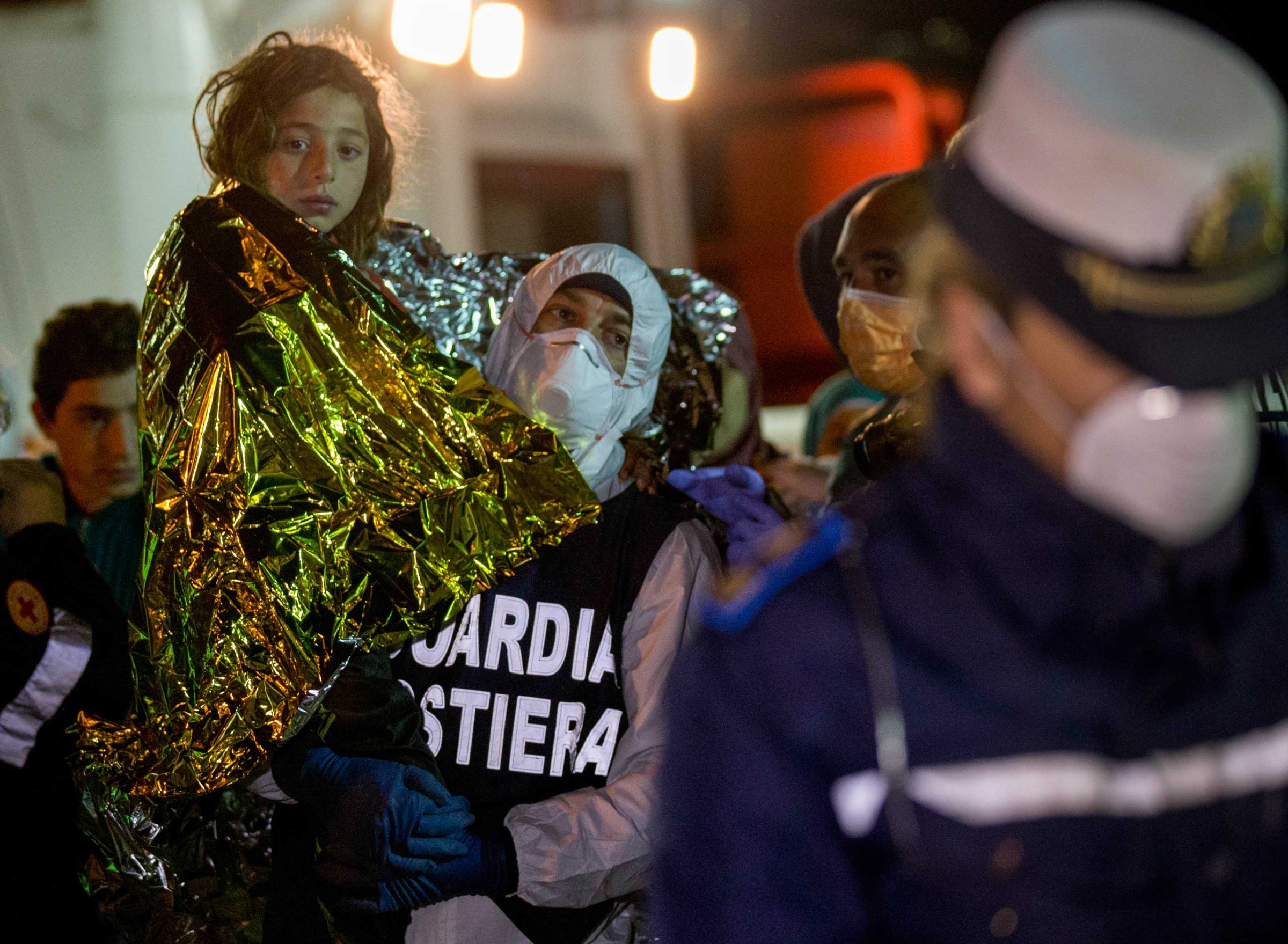
Hundreds of migrants were rescued from two separate boats on the Mediterranean on Monday as European Union officials rushed to find a way to reduce the numbers of migrants crossing the sea and save the ones who make the journey.
According to reports, one boat off the Libyan coast was carrying about 300 people, and another off the Greek island of Rhodes, from which about 80 migrants were rescued from the sea. That came just one day after about 700 migrants trying to get to Europe are believed to have drowned in the Mediterranean’s Strait of Sicily near Libya—the single worst loss of life in years of a spiraling migrant crisis. The overloaded fishing boat tilted, and then sank, after hundreds of passengers rushed to one side of the vessel in order to hail a passing Portuguese merchant ship.
With more than 1,000 people drowned in the past week alone—the deadliest week in memory—foreign and interior ministers of the E.U.’s 28 countries met in Luxembourg to thrash out a strategy and to coordinate E.U. efforts. The plan includes increasing funding to the E.U.’s border-patrol program at sea and expanding its brief to rescuing people—something aid organizations have pushed for for months—and trying to push Libyan politicians to form a united government, to resolve the chaos there. “With this latest tragedy, we have no more excuses, the E.U. has no more excuses, the member states have no more excuses,” the E.U.’s foreign policy chief Federica Mogherini told reporters. “We need immediate action from the E.U.”
E.U. officials announced that the continent’s leaders would hold an emergency summit on Thursday.”We have to stem the flow from the Libyan side,” Malta’s Prime Minister George Vella told CNN on Monday. “The numbers are being augmented by those who are making mountains of money from these poor people.” With a similar message, British Prime Minister David Cameron, speaking during an election campaign in Cheshire, England, called the scenes of overloaded migrant boats “horrific,” and said, “We should put the blame squarely on the appalling human traffickers.”
Yet the situation is more complex than that. Despite the veneer of unity in Luxembourg among E.U. officials, Europe is sharply divided over whether to mount search-and-rescue efforts in international waters. Several E.U. leaders fear such efforts would encourage thousands more migrants to try make it to Europe—the so-called pull factor—at a time when right-wing political parties have soared in national elections on a message of limited immigration to Europe.
Last November, the E.U. scrapped funding for an Italian maritime rescue program, Mare Nostrum, and replaced it with an E.U. program called Triton, whose $3.1 million monthly budget is one third its predecessor’s budget. Unlike the defunct Mare Nostrum, the E.U. program is focused on border control, and limits its boats to patrolling only to within 30 miles of Europe’s sea borders—leaving tens of thousands of migrants vulnerable to drowning on the high seas or close to the North African coast.
That decision has proved disastrous, according to refugee officials, who say that limiting rescue programs has not deterred migrants trying to cross the Mediterranean. “If you accuse Mare Nostrum of being a pull factor, that means you do not want people to come, at any cost, even if you see them sink in the sea,” says Christopher Hein, director of the Italian Council for Refugees, one of the only international aid organizations working with migrants inside Libya. “Nobody would be so cynical to say so openly, but this is the logical consequence of this policy.”
Father Mussie Zerai, a Catholic priest from Eritrea, has been been a telephonic lifeline for thousands for migrants for years. From his home in Switzerland, Zerai fielded hundreds of migrants’ distress calls from sea, and would immediately raise the alarm with Italian or Maltese coastguards, who then dispatched rescue teams. As his fame spread among African migrants trying to cross the Mediterranean, his number spread too, even written on the walls of migrant detention centers in Libya.
All week, the frantic calls have come from inside rickety boats on the Mediterranean, with voices crying desperate pleas. “Help us! Help us!” they shout, down a crackling telephone line from the middle of the sea, to one of the very few people in Europe whose mobile numbers they have at hand: “I’ve received at least seven or eight distress calls from the sea in the last week,” says Zerai, describing several calls from migrants while crammed into boats. “There are pregnant women giving birth in the boat. People are in really bad condition. They are panicking, especially the women and children,” he says, then sighs, “It is just shocking.”
But he says his rescue efforts have become far more difficult, now that Italy’s rescue program—which had a monthly budget of about $10 million—has been cancelled. “The passengers call and give me all the information, even the condition of the boat, and I give that all to the Italian and Maltese coastguard,” he says. “But now I call the coastguard, and they say they need time to move to international waters,” he says. “That means many, many hours. In that time, people can die.”
More Must-Reads from TIME
- Donald Trump Is TIME's 2024 Person of the Year
- Why We Chose Trump as Person of the Year
- Is Intermittent Fasting Good or Bad for You?
- The 100 Must-Read Books of 2024
- The 20 Best Christmas TV Episodes
- Column: If Optimism Feels Ridiculous Now, Try Hope
- The Future of Climate Action Is Trade Policy
- Merle Bombardieri Is Helping People Make the Baby Decision
Contact us at letters@time.com